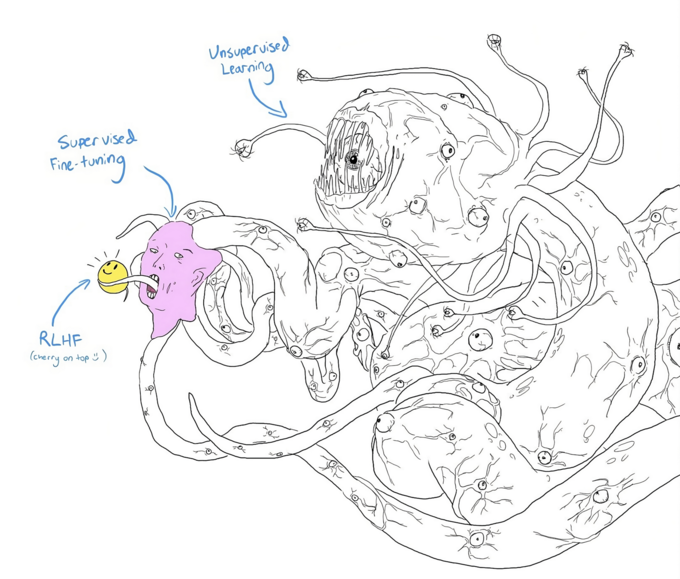Reflections on AI
FLI interview with Connor Leahy
May 6, 2023 Source
In a recent episode from the Future of Life Institute podcast, the host interviewed Connor Leahy, the CEO of a company called Conjecture. I was not familiar with Leahy before listening to this episode.
They began by discussing how with the advent of ChatGPT AI is becoming mainstream. Leahy noted that he grew up in a rural town, and that even his family members who seldom use computers have been asking about AI. Leahy said he feels that the leap from GPT-3 to GPT-4 was just as big as the leap from 2 to 3, and that he does not believe progress is slowing down or that we’re likely to hit diminishing returns any time soon.
Leahy is very concerned about AI safety and the alignment problem. I found his general attitude about AGI to be similar to that of Eliezer Yudkowsky, i.e. he seems quite confident that if society continues down its current trajectory— that is, with AI labs building increasingly powerful large language models until human-level intelligence is achieved—it will lead to humanity’s downfall. Leahy treated this as fairly obvious and claimed that when you describe AGI to everyday people, most people say, “That is obviously a bad idea; don’t build that.”
Yudkowsky has his “inscrutable matrices” as his phrase of choice (he also likes “alien actress”); Leahy has Shoggoth memes: images depicting Lovecraftian creatures with monstrous tentacled bodies, with innocent-looking smiley faces attached to them. Both men fear that AI systems that are designed like today’s so-called LLMs (by the way, Leahy does not like the name “large language model” because he feels it gives people a false sense of security based on the idea that they only operate on language) are far too opaque to be considered safe. As they become more powerful, they will become increasingly good at convincing us they are human-like (the smiley face) when on the inside they are something very different and foreign to us (the tentacled monster).

As a small example of this, Leahy referred to the known cases of image recognition systems being tricked by a single pixel change into labeling a horse as a dog, a dog as a cat, or a car as an airplane. These are not mistakes that most humans would make, and they show according to Leahy that the way these systems model the world is alien to us.
![]()
Leahy said this is to be expected when you consider how these models learn compared to how humans learn. If you took a human brain, Leahy said, removed it from all sensory input, connected it to some apparatus that only processed a two-way stream of binary data connected to an array of switches with on/off states for a million years, and then put it back in a human body, that thing would not be a human.
Now that we’re 6 paragraphs in, I should probably summarize the actual central topic of the interview, which is Leahy’s proposal for a type of system called a “CoEm”, or cognitive emulator.
As far as I can tell, the idea behind CoEms is quite similar to what Paul Christiano described in his Bankless interview as scalable oversight, which is all about ensuring that the behavior of AI systems can be understood by humans even as those systems become more intelligent than we are.
The best way I can think of to describe the idea behind a CoEm is to start by contrasting it with what it is not like. A CoEm would not be like a large language model, which is a big black box: it has impressive capabilities, but we don’t understand how it does what it does, because it doesn’t “think” the way a human thinks. In contrast, a CoEm would be built from components that adhere to certain rules and constraints that we can understand, and which correspond to our own cognitive functions. I think the idea is that a CoEm would follow a thought process that humans could follow and validate, reducing our need to fear Shoggoth-like monstrosities that merely mimic our output but think in alien ways we can’t comprehend.
I’m not totally confident that I fully grasped the nuances of the idea of CoEms. The host actually tried to describe it once or twice and Leahy didn’t seem to think that he got it. I think a metaphor that they eventually agreed on was one of a human corporation, where you can speak to any individual human employee and they can explain what they’re doing and how it relates to the corporation’s broader goals. However, if this is a good metaphor, then I find myself skeptical since I tend to think a corporation exhibits emergent behavior that may not be apparent from the individual actions of its employees; i.e. it can still end up being a black box, even if it’s seemingly composed of clear boxes.
As Leahy put it: “Once you have a black box, you’re screwed.” I have my doubts that there’s really any escaping some black boxes. After all, one could argue that human beings are themselves black boxes to one another (as philosophers have known for ages).
But we haven’t all killed each other… yet. That fact makes me hopeful that any progress we make towards making AI that is more “human-like” is likely in the right direction.